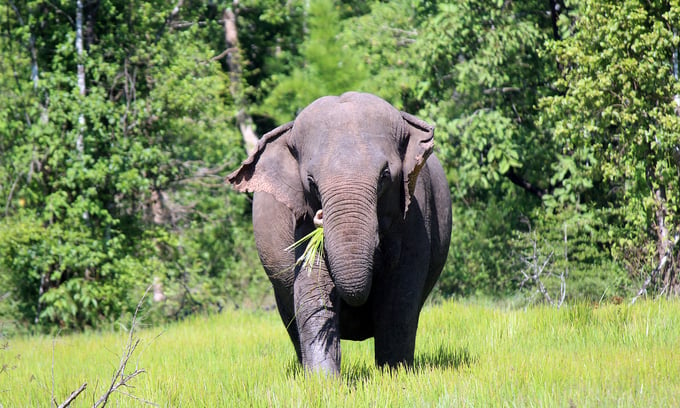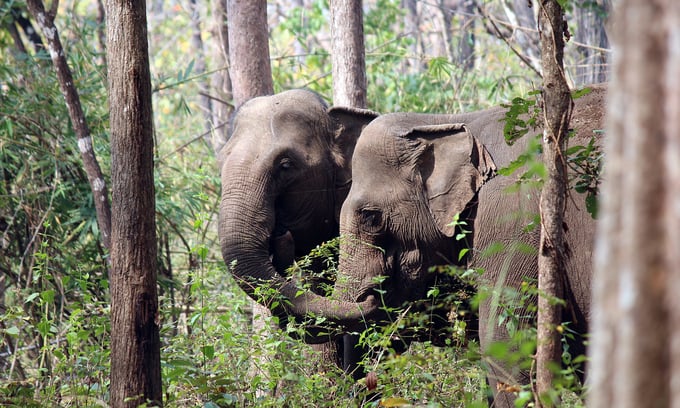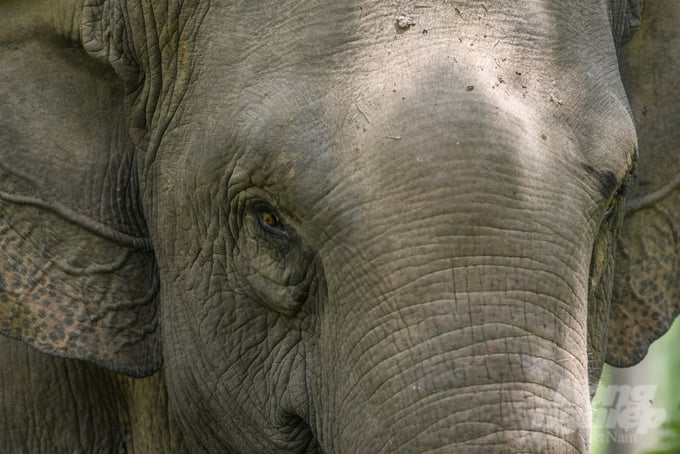June 20, 2025 | 06:28 GMT +7
June 20, 2025 | 06:28 GMT +7
Hotline: 0913.378.918
June 20, 2025 | 06:28 GMT +7
Hotline: 0913.378.918

Elephant Y Khun, 67 years old, participated in the campaign to remove Tanh Linh elephant in 2001.
Born in 1956, Y Khun is the oldest individual in the Yok Don National Park’s elephant tourism program. The lady elephant loves cleanliness and having her own space – she is very picky when it comes to eating. When she encounters her favorite dish, clumping bamboo, she hesitates to knock the whole cluster immediately. Instead, she chooses the best bit, plucks a bunch then leisurely finds another food source.
Y Khun loves mud baths like other elephants and spending hours in the water. If the road is bland and littered with other elephants’ droppings, Y Khun will avoid it and insist on finding another way. Even when thirsty, Y Khun patiently endures if she detects that the water smells strange. She never drinks water from puddles or small streams but only enjoys water from large rivers and streams.
Y Khun’s gestures seem close to her name’s meaning which denotes luck. Since birth, she has been popular with the Don village people. Y Khun is known for her ability to capture wild elephants. By the day of “retirement,” she had captured four baby elephants and assisted many families in transporting wood, rice, and other crops.
A memorable thing about Y Khun is its back. Usually elephant’s back are straight; some has sloping backs. However, they can develop scoliosis if they have to carry heavy loads for a long time. From Y Khun’s front foot to the mid-abdomen is concave downward, as if being crushed by a thousand-pound stone.
A famous case rescued by the World Wide Fund for Nature (WWF) in Thailand is still passed on by Yok Don National Park officials. The Pai Lin elephant is over 70 years old. Its body is visibly deformed, with many scars from constantly wearing a large armchair (the type that can hold up to 6 people). More than 15 years ago, when Pai Lin was rescued, it was scared, dehydrated, underweight and suffering from a respiratory infection that led to a runny nose and eyes.
According to Huynh Nghia Hiep, Deputy Director of Yok Don National Park, when Y Khun became part of the park in 2001, the elephant’s spine was diagnosed as “harmed.” Although not to the extent of his friend Pai Lin in Thailand, Y Khun needs active interventions.
“Elephants are known for their strength and size, but their backs are not meant to carry people. Elephant dorsal bone has a raised structure. As a result, the constant pressure from tourists on elephant spines can lead to permanent physical damage. The spinal deformity of elephants is irreversible,” Mr. Hiep shared.
Tourist elephants often work relentlessly. They carry the weight of mahouts, tourists and armchairs. Over the years, their bones and tissues degenerate.

In the garden, Y Khun (on the left) and Bun Kham are close friends. They are seen together almost everywhere they go.
Maybe because of this back pain, Y Khun is quite stubborn when he returns to the garden. Mr. Y Muc, the caretaker assigned to care for the elephant, sometimes thought she was a male elephant. Compared to her peers, Y Khun is more aggressive. Her personality is hot and cold, ready to sneak up on people if they invade her private space. Even the name partly shows the personality of this old lady. To distinguish gender, the Ede people often use the name “Y” for male and “H” for female, similar to the middle names “Van” and “Thi” of the Kinh people. In Yok Don National Park, female elephants have names beginning with “H,” such as H’Pló, H’Blú. Only Y Khun, even a female elephant, has “Y” in her name.
“When I first took care of Y Khun, I couldn’t sleep many nights. Almost every day, we have to follow her and be really observant to detect changes in daily behavior,” recalled Mr. Y Muc.
In the park, Y Khun is only friendly to Bun Kham, nine years younger than her. Unlike the big sister, the elephant whose name means “Golden Girl” is quite greedy and not meticulous in choosing food. She is also one of the first elephants to work for Yok Don National Park, a practical assistant to the rangers during forest patrols.
The story of Y Khun amused us. After many days traversing around Buon Don district, thanks to the local people’s word of mouth, we found Mr. Y Mat, the owner of the 70-year-old elephant before it was sent to the national park.
Over 50 years old, but Y Mat is as agile as a wild deer. He was a forest ranger for 30 years, so he has traveled to every mountain and water stream in Yok Don in his patrols. Whenever he heard about a location with a precious variety of red tea, he would go on the road with rice balls of salt and sesame.
“Almost every day, I went to the forest. Some days I went up to 30 kilometers, counting and looking at each canopy. Being in the green forest, all my worries and fatigue disappear,” Y Mat said.

Elephants are brilliant animals. In the wild, they live in herds that can reach dozens of individuals. Photo: Tung Dinh.
Looking at the sunken eyes, and hearing the voice as loud as the dipterocarp forest in the changing season, we understand that Y Mat has many confidants. To quickly steer the story to the main topic, we asked him if he remembered Y Khun.
“How can I forget, misters,” Y Mat replies, his eyes expressing the reminiscence of an old friend. After finishing a teacup, he tells us about Y Khun’s backstory. The elephant is a gift that his father left the family. In the 1990s, when Y Mat rode the elephant in the village, he felt majestic, just like driving today’s billion-dollar supercars down the street. Everyone was in awe and looked at Y Eye with admiring eyes.
Hunting elephants is difficult, but to have an elephant that understands, works hard and knows how to hunt wild elephants is even more difficult. Thanks to Y Khun, Y Mat’s family has food to eat. In contrast, the whole family considers the 1956-born elephant as a family member. Every time there is a festival or an anniversary, Y Khun participates. On that day, the ladies can wear skirts, eat and drink in large troughs that are kept separate. For a few days, Y Khun would not have to work.
Life would still be so peaceful if it were not for the Tanh Linh forest elephant incident at the end of 2001. On that day, the Ministry of Agriculture and Rural Development coordinated with the provinces to implement a large-scale campaign to relocate nine individuals destructive elephants from Binh Thuan. Many foreign experts, including Malaysia, were invited. Field ranger posts sprawled like mushrooms in hot spots.
The most difficult task was to find two strong domestic elephants experienced in hunting wild elephants and especially to suppress the leading male elephant in Tanh Linh. After days of face-to-face evaluation, Y Khun was among the chosen ones. Although Y Mat’s family did not want to part with this longtime member, but for the common good of the community, they decided to sell it for about 45 million VND.
Together with Y Khun, Mr. Y Mat entered a special campaign in the rainy season in 2001. Three times a day, he went to the forest to supplement Y Khun with nutritious foods such as sugarcane and bananas. He also helps experts to train the elephants. Since Y Khun was already used to hunting wild elephants, she quickly grasped it. By November, she was familiar the Kamaz specialized vehicle, as well as memorized the instructions to later pressure the Tanh Linh male elephant into the car.
Translated by Quynh Chi

(VAN) The waste of resources from agricultural by-products and the situation of counterfeit and poor quality goods in production causing losses of thousands of billions were pointed out by the National Assembly deputy.

(VAN) After 5 years of implementation, the CAI initiative has helped coffee growers change their farming practices, moving toward responsible agriculture that meets global export standards.

(VAN) The primary prerequisite for the comprehensive and robust integration of Vietnam's livestock sector into the global value chain is the establishment of a disease control system.

(VAN) The results of national programs are essential for establishing a contemporary livestock sector that is well-equipped to meet the demands of both domestic and international markets, with robust biosafety standards.

(VAN) The UNESCO Global Geopark revalidation of Non nuoc Cao Bang and the transition to a two-tier administrative model are presently undergoing a pivotal moment in Cao Bang, the northernmost province of Vietnam.
/2025/06/13/5330-2-004539_953.jpg)
(VAN) Changing policy mindset and removing investment barriers are urgent requirements to open up new development space for enterprises in the agricultural sector.

(VAN) The areas include the restoration of five million hectares of marine ecosystems.